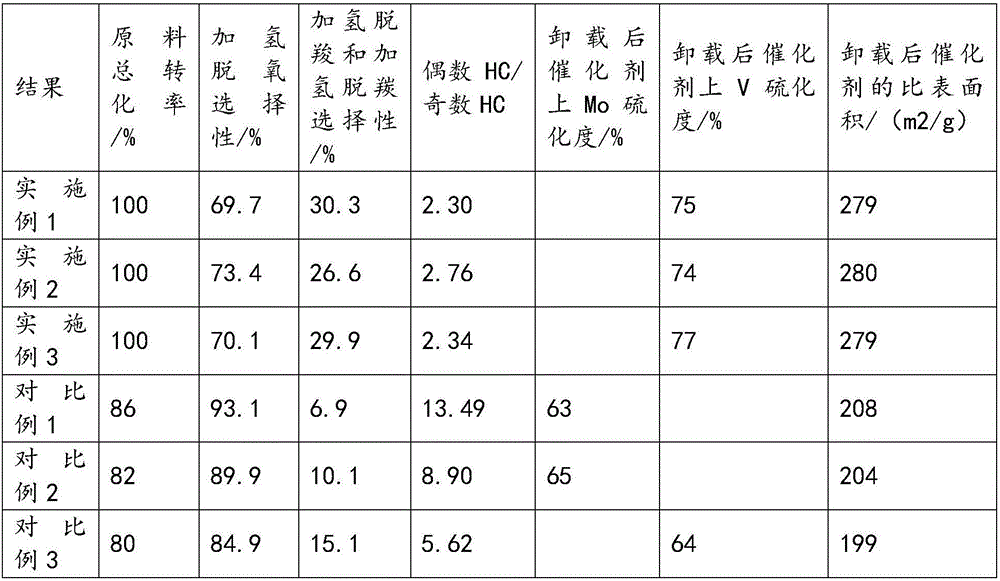Catalyst for hydrodeoxygenation of bio-oil and preparation method of catalyst
A hydrodeoxygenation and catalyst technology, which is applied in the field of bio-oil hydrodeoxygenation catalyst and its preparation, can solve the problems of poor hydrothermal stability, easy aggregation and deactivation of catalyst active phase, etc. The effect of stabilizing and improving the performance of sulfur fixation
- Summary
- Abstract
- Description
- Claims
- Application Information
AI Technical Summary
Problems solved by technology
Method used
Image
Examples
Embodiment 1
[0038] (1) Preparation of oxidation state catalyst:
[0039] Take by weighing 1000 grams of dry rubber powder and 30 grams of safflower powder and mix them evenly, then add 900 milliliters of aqueous solution containing 28 g of nitric acid, and extrude them into cylindrical wet bars with an outer diameter of φ1.4 mm on a plunger extruder. Then the cylindrical wet strip was dried at 120°C for 4 hours, and then calcined at 600°C for 3 hours to obtain carrier Z with a pore volume of 0.62mL / g and a specific surface area of 280m 2 / g.
[0040] Add 50g of ammonium metavanadate, 50g of manganese carbonate and 1000g of citric acid into 400mL of aqueous solution, heat and stir until completely dissolved to obtain 500mL of impregnation solution. Take 400g of the above-mentioned carrier Z, spray all the above-mentioned impregnating liquid evenly on the carrier Z, then put the obtained semi-dry catalyst into an oven and dry it at 120°C for 4 hours, and then place it in a ventilated tub...
Embodiment 2
[0047] (1) Preparation of oxidation state catalyst:
[0048] Take by weighing 1000 grams of dry rubber powder and 30 grams of safflower powder and mix them evenly, then add 900 milliliters of aqueous solution containing 28 g of nitric acid, and extrude them into cylindrical wet bars with an outer diameter of φ1.4 mm on a plunger extruder. Then the cylindrical wet strip was dried at 120°C for 4 hours, and then calcined at 600°C for 3 hours to obtain carrier Z with a pore volume of 0.62mL / g and a specific surface area of 280m 2 / g.
[0049] Add 28g of ammonium metavanadate and 18g of manganese carbonate into 350mL of citric acid aqueous solution, heat and stir until the ammonium metavanadate and citric acid are completely dissolved to obtain 500mL of impregnation solution. The same method as in Example 1 was used to impregnate the support Z to obtain the hydrodeoxygenation catalyst C2.
[0050] (2) Pretreatment before vulcanization
[0051] Phosphoric acid is selected as th...
Embodiment 3
[0056] (1) Preparation of oxidation state catalyst:
[0057] Take by weighing 1000 grams of dry rubber powder and 30 grams of safflower powder and mix them evenly, then add 900 milliliters of aqueous solution containing 28 g of nitric acid, and extrude them into cylindrical wet bars with an outer diameter of φ1.4 mm on a plunger extruder. Then the cylindrical wet strip was dried at 120°C for 4 hours, and then calcined at 600°C for 3 hours to obtain carrier Z with a pore volume of 0.62mL / g and a specific surface area of 280m 2 / g.
[0058] Add 60g of ammonium metavanadate and 70g of manganese carbonate into 350mL of aqueous solution, heat and stir until the ammonium metavanadate and citric acid are completely dissolved to obtain 500mL of impregnation solution. The same method as in Example 1 was used to impregnate the carrier Z to obtain the hydrodeoxygenation catalyst C3.
[0059] (2) Pretreatment before vulcanization
[0060]Phosphoric acid is selected as the VA oxygen-c...
PUM
| Property | Measurement | Unit |
|---|---|---|
| Pore volume | aaaaa | aaaaa |
| Specific surface area | aaaaa | aaaaa |
| Density | aaaaa | aaaaa |
Abstract
Description
Claims
Application Information
 Login to View More
Login to View More - R&D
- Intellectual Property
- Life Sciences
- Materials
- Tech Scout
- Unparalleled Data Quality
- Higher Quality Content
- 60% Fewer Hallucinations
Browse by: Latest US Patents, China's latest patents, Technical Efficacy Thesaurus, Application Domain, Technology Topic, Popular Technical Reports.
© 2025 PatSnap. All rights reserved.Legal|Privacy policy|Modern Slavery Act Transparency Statement|Sitemap|About US| Contact US: help@patsnap.com



